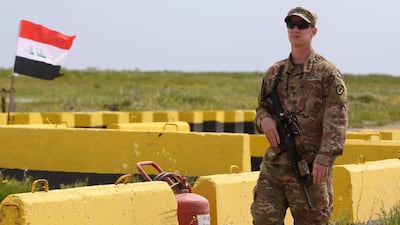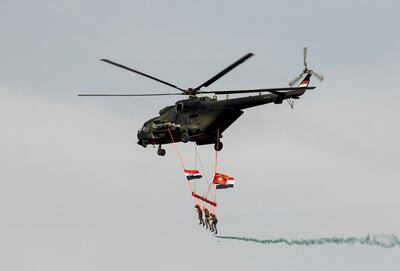This has been a week of anniversaries for Iraq. Today, Prime Minister Mustafa Al Kadhimi celebrates one year since he became prime minister-designate. And on this same date in 2003, US troops pulled down an infamous statue of the country's former president, Saddam Hussein.
Iraq has had a difficult 18 years since the dictator was toppled. Corruption, economic mismanagement and weak security and infrastructure have eroded the state. Citizens have protested to no avail, with many left dead and wounded in the process, the majority of them young.
This week, The National spoke to Prime Minister Al Kadhimi, the man who is hoping to reverse this decline. During the interview a main priority of his shone through: the wish to oversee "early, fair and secure elections that are conducted with integrity". Mr Al Kadhimi is convinced that reform and a better future start with a revival of Iraqi institutions, particularly the ability to conduct a legitimate democratic process.
For a nation facing huge social and economic challenges, tinkering with seemingly small constitutional details – such as breaking an impasse at the country's Federal Supreme Court – might seem to some like a confusion of priorities. But he is right to do so. Immediately attempting a flurry of grand changes would be doomed to fail in Iraq's current dysfunction. Mr Al Kadhimi's early tenure has focused on addressing institutional details, political maturity that might give the nation a basis from which to tackle bigger issues. His scheme last month to grant visas on arrival to passport holders from 36 countries will encourage foreign investment, much needed if the country is to create jobs and strengthen its ailing economy. He is also tightening customs controls and clamping down on corruption at border outposts, which have become hotspots for fraud.
Mr Al Kadhimi is winning support abroad. He was the first Arab leader to receive a call from US President Joe Biden. This week's third round of strategic talks with America resulted in the US affirming support for Iraq's public health system, environmental conservation and, crucially, a security relationship that can help stabilise it. Former US president Donald Trump vowed to remove American troops from the country, considered by many to be a risky move. Mr Biden has reversed this and a small contingent of troops will likely remain to provide training and assistance.
After years of ambivalence, Baghdad's relationship with the GCC is prospering. Mr Al Kadhimi was in the UAE last Sunday to meet its leaders, having previously visited Saudi Arabia. Both countries have committed to $3bn each in investment funds in the country. And the UAE continues to support the rebuilding of Mosul after ISIS destroyed much of its precious cultural heritage. Iraq might also be connected to a Gulf-Jordan electricity grid. Baghdad is trying to diversify its struggling energy sector, which frequently sees outages.
Iraqis have good reasons to link ongoing ills to the poisonous legacy of Saddam’s rule. But the country's younger generation, who never experienced his reign, are far less likely to buy into this catch-all narrative. Mr Al Kadhimi is trying to move on and his diagnosis of Iraq's troubles are correct. What matters now is whether the system allows him to treat the institutional rot that has been setting in for years.



